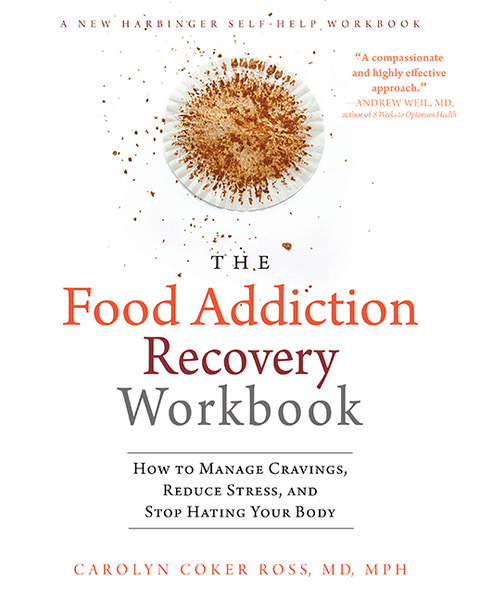
I met Dr. Carolyn Coker Ross years ago when I lived in Nashville, Tennessee. She never ceases to amaze me! Her new book, The Food Addiction Recovery Workbook, is another example. Backed by the latest science and filled with compassion, I highly recommend this book to anyone struggling with eating and body image. Thanks, Dr. Ross, for sharing a beautiful and helpful excerpt with us here. Also, thank you for donating a signed book to one lucky winner.
For a chance to win a signed book, see information at the bottom of this post.
Excerpt, The Food Addiction Recovery Workbook
You may think that by calling yourself “fat” or “lazy” or “disgusting,” you can motivate yourself to change your eating behaviors and lose weight. Perhaps you’ve tried to whip yourself into shape by using negative feedback and negative self-talk. However, as one of my clients eventually realized, “You can’t hate yourself thin!”
If this strategy were an effective one, the increase in weight-based stigmatization in our culture would have led to a decrease in obesity, rather than the significant increase we’ve seen over the past forty years. Studies have shown that obese people who believe in weight-based stereotypes are in fact less likely to change their behaviors and more likely to binge eat.
If self-hatred won’t help you overcome your struggles with your eating and your weight, what will? The key is to understand the importance of your thoughts.
You may be thinking, “But if my thighs weren’t so big (or whatever), I wouldn’t hate my body.” Yet body hatred is not always associated with body weight, shape, or size. It is your perception of your body that causes suffering. If your perception is that your body doesn’t live up to whatever you would like your body to look like or what you feel is expected by society, then your perception is what needs to change, not your body.
Your body just is the way it is, and nothing will change by your berating, judging, and calling your body names. If you could “hate yourself thin,” it would already have happened, don’t you think?

Harsh words can provoke shame, fear, anger, or sadness. This is true whether we hear those words from other people or inflict them on ourselves. So the next step is to change how you talk to yourself about your body.
You may doubt that your words and thoughts about your body have any effect on your body or on your behaviors. But if you have a pet or young children, you know that your words affect them very strongly. Shout at your kids, and you can bring them to tears. Saying something mean to your partner in anger can scar your relationship for a long time. If words matter in your relationships with other people, surely they matter in your relationship with your own body, too.
So, what have your words and your thoughts been telling your body? Is this the message you want to give? What emotions do your own words provoke in you? Is this the way you want to feel?
I pose these questions not as another way to shame you, but as an invitation to wake up to the reality that your body is listening to what you say and responding, just as it listens to what others have said about you.
Do you want to continue to send your body negative messages, or would you like to experience a different way of relating? Can you imagine what it would be like if you stopped struggling against your body and started working with it? How different might things be?
Consider the concept of unconditional positive regard. Psychologist Carl Rogers wrote that all people have within themselves vast resources for self-understanding and for changing their self-concept, attitudes, and behaviors, if the right climate can be provided.
You can apply the same approach to changing your relationship to your body. No matter how you feel your body has failed you, no matter what your thoughts tell you about your body, you can declare unconditional positive regard toward your body, thereby nurturing a new, more mature relationship with your body.
Try making unconditional positive statements that begin “My body is…” For instance, you might say “My body is wise.” Then ask yourself, “How is my body wise? If I were to act as if my body was wise, how would I think about my body differently? How would I treat it differently?”
Try putting these statements of unconditional positive regard on sticky notes and posting them around your house. It may sound silly, but it truly can help you begin to internalize these new messages.
After so many years of seeing your body as flawed, it may be challenging to regard yourself with love and compassion. But every living organism thrives better in a climate that nurtures its growth. Your body is no different. With patience and commitment, it is entirely possible to learn to treat yourself more kindly. And when you relate to your body in a new way, you will finally be free to live the life of your dreams.
Excerpted from The Food Addiction Recovery Workbook: How to Manage Your Cravings, Reduce Stress, and Stop Hating Your Body by Carolyn Coker Ross.
Win a Signed Book! To enter to win a copy signed by Dr. Ross, please post a comment below, sharing one unconditional positive statement about your body. As Dr. Ross suggests above, an example is, “My body is wise.” One winner will be selected from all who comment.








